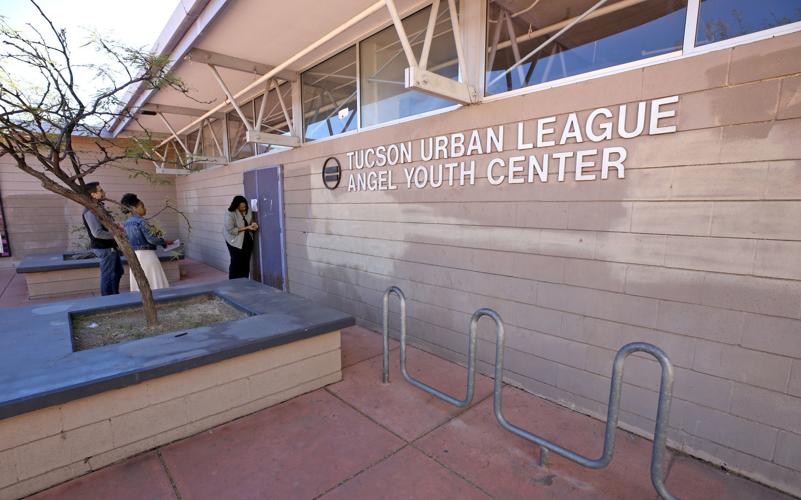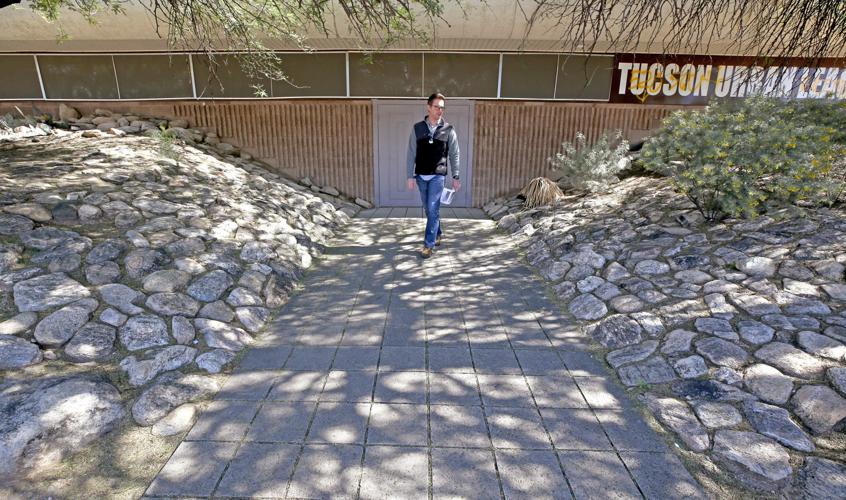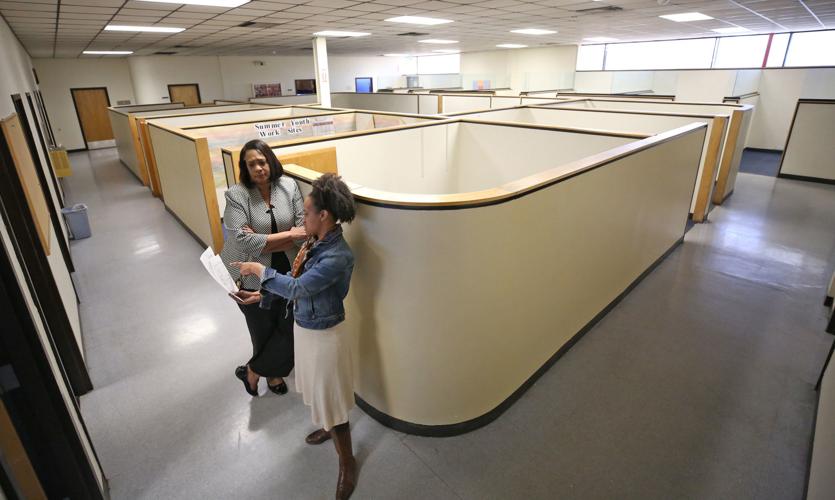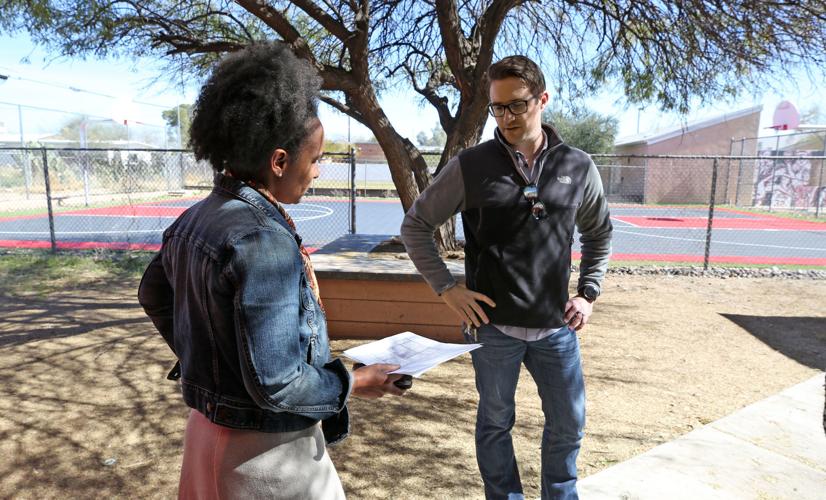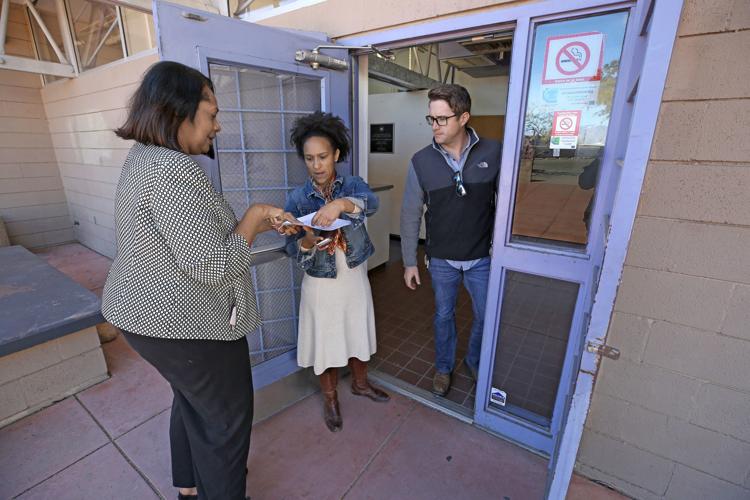Much-needed economic development may be coming to the neighborhoods along the South Park Avenue corridor on the city’s southside, and the Tucson Urban League may be poised to make it happen.
Originally, changing demographics and the increasing cost of maintaining their two old decaying buildings contributed to the decision for the Urban League to move last March from their long-time facility at 2305 S. Park Ave. to midtown, said Deborah L. Embry, the president and CEO since 2013.
The two buildings on the property — the main facility which is 7,500 square feet and the 11,000-square-foot Angel Youth Center — were too big and costly to operate.
But after the buildings were on the market for about a year, the Urban League decided to instead convert both into high-quality spaces for small businesses of color.
The vision would repurpose the buildings and make them into an entrepreneurial center, creating a small business hub with support workshops and working spaces for businesses just starting out, Embry said.
“It would provide entrepreneurial opportunities for people living in the surrounding neighborhood on South Park,” she said.
Ideally, the space would house a mix of businesses to attract people from the surrounding neighborhood.
Space would be offered for diverse businesses like coffee shops and bakeries and may attract cultural businesses like barber shops, hair and nail salons.
Retail stores showcasing African-American designers could also occupy spaces, she said, as well as yoga, martial arts and other health and wellness businesses.
While the Urban League could see additional revenue generated as occupants pay for their leased or rented spaces as they conduct their business, the business hub could bring people back into the neighborhood and provide economic empowerment through job creation.
“It is a perfect fit for our organization and it is aligned with our current mission,” Embry said.
There is also preliminary talk of an incubator kitchen, Embry said.
The timetable for the renovation, the projected cost and the launch of operations depends on funding and what the developer proposes, Embry said.
In January, Embry approached the Urban League’s board members and stakeholders, including Ward 5 City Councilman Richard Fimbres, who agree with the proposal to repurpose the aging buildings, she said.
COMMUNITY CONNECTION
Even though the Urban League now leases a 2,700 square foot space for its main facility at 3425 E. Grant Road, west of North Dodge Boulevard, “We never really left the (South Park) community since we have always been providing services at the Quincie Douglas Community Center,” Embry said.
The center is a short distance away, at 1575 E. 36th St., off South Kino Parkway.
Then, there is the UA Tech Park at The Bridges, Tucson’s newest development that is expected to include a technology precinct with mixed-use development — literally around the corner from the League’s buildings.
All this may present an opportunity for the Urban League, said Embry, who currently serves on the advisory committee for The Bridges.
“When the Tech Park’s education facility is finished in a few years, there would be partnerships with entrepreneurism, meeting space, incubation and more,” she said.
Still, rejuvenating the old buildings on South Park could bring a new sense of community to the location where many African-Americans left years ago, Embry said.
“My vision for the project is to showcase our African-American culture and provide a gathering place for families and business professionals.”
CHANGING DEMOGRAPHICS
Over the years, the demographics involving Tucson’s African-American population began to change, which played into the Tucson Urban League’s move to the city’s north side in May 2018, Embry said.
People living in the 85716 ZIP code area reflected a population tipping point and it now has the highest number of African-Americans living in Tucson, Embry said.
The major boundaries for that ZIP code are River Road on the north, Alvernon Way on the east, 22nd Street on the south and Tucson Boulevard on the west.
So, moving into the area was a logical choice for the Urban League.
When looking at census data, Embry also learned the second highest concentration of African-Americans are in 85710, on the city’s east side, and the third highest are in 85713, in the south central part of Tucson.
“The one thing different about Tucson, more than any other city in the country, is that there is no one area where there is a concentration of African-Americans. There is no black community,” Embry said. “We live everywhere.”
When it arrived, the Urban League set out to improve its new neighborhood by taking a targeted approach by leveraging their programs to make changes.
“We identified four neighborhoods along the Alvernon-Grant corridor where we can do more focused weatherization programs to help our new neighbors,” Embry said.
Their weatherization program helps families determine the best ways to make their homes more energy-efficient by pointing out where they may be losing cool or warm air. Once discovered, they make small repairs and recommendations to improve efficiency.
SERVING TUCSONANS IN NEED
Since their move, Urban League services have not diminished. In fact, Embry said, “They have actually expanded and we now operate at nine facilities across the city.”
The Grant location also offers housing services, which involves one-on-one housing and foreclosure counseling, Embry said.
At the same time, the Urban League does more than work with African-Americans.
It serves between 10,000 to 12,000 people a year providing access to opportunity for African-Americans, other people of color and low-income families and individuals.
The Urban League attempts to reach out to serve the needy by providing a variety of programs that fall into different categories.
Programs focus on education and youth, housing and asset building, as well as a workforce and economic development program.
Many of their programs are made possible with the help of a long list of community partners that serve in various government and non-governmental social service organizations, Embry said.
“Our biggest goal is to serve as many people as we can with services that impact their quality of life,” Embry said.


